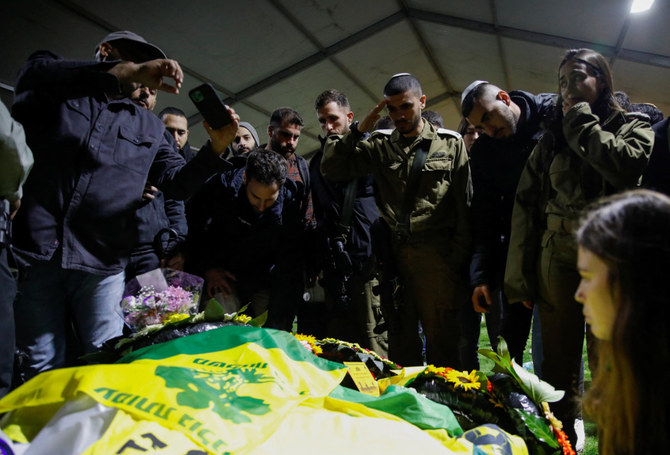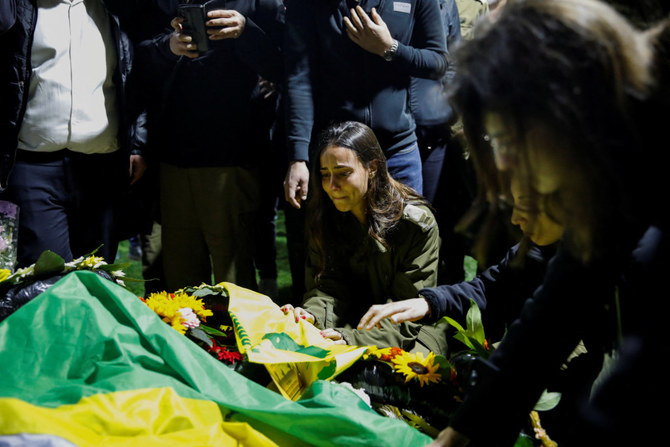DEIR AL-BALAH, Gaza Strip: Palestinian militants carried out one of the deadliest single attacks on Israeli soldiers since the Gaza invasion began, killing at least nine in an urban ambush, the military said Wednesday, a sign of the stiff resistance Hamas still poses despite more than two months of devastating bombardment.
The ambush in a dense neighborhood came after repeated recent claims by the Israeli military that it had broken Hamas’ command structure in northern Gaza, encircled remaining pockets of fighters, killed thousands of militants and detained hundreds more.
The tenacious fighting underscores how far Israel appears to be from its aim of destroying Hamas — even after the military unleashed one of the 21st century’s most destructive onslaughts. Israel’s air and ground assault has killed more than 18,600 Palestinians, according to Gaza’s health officials. Gaza City and surrounding towns have been pounded to ruins. Nearly 1.9 million people have been driven from their homes.
The resulting humanitarian crisis has sparked international outrage. The United States has repeatedly called on Israel to take greater measures to spare civilians, even as it has blocked international calls for a cease-fire and rushed military aid to its close ally.
Israeli troops are still locked in heavy combat with Palestinian fighters in and around Gaza City, more than six weeks after invading Gaza’s north following the militants’ Oct. 7 attack.
Clashes raged overnight and into Wednesday in multiple areas, with especially heavy fighting in Shijaiyah, a dense neighborhood that was the scene of a major battle during the 2014 war between Israel and Hamas.
“It’s terrifying. We couldn’t sleep,” Mustafa Abu Taha, a Palestinian agricultural worker who lives in the neighborhood, said by phone. “The situation is getting worse, and we don’t have a safe place to go.”
The ambush took place Tuesday in Shijaiyah, where troops searching a cluster of buildings lost communication with four soldiers who had come under fire, the military said. When the other soldiers launched a rescue operation, they were ambushed with heavy gunfire and explosives.
Among the nine dead were Col. Itzhak Ben Basat, 44, the most senior officer to have been killed in the ground operation, and Lt. Col. Tomer Grinberg, a battalion commander.
Prime Minister Benjamin Netanyahu said it was a “very difficult day,” but he rejected international calls for a cease-fire.
“We are continuing until the end, there is no question. I say this even given the great pain and the international pressure. Nothing will stop us, we will continue until the end, until victory, nothing less,” he said in a talk with military commanders.
SUFFERING IN THE SOUTH
Heavy rainfall overnight swamped tent camps in Gaza’s south, where Israel has told people to seek refuge, even as that region has also come under daily bombardment.
In the central city of Deir Al-Balah, the storm brought cold winds and flooded a shelter area behind a hospital, sending torrents of water coursing between the tents. “The situation is catastrophic,” said Ibrahim Arafat, a father of 13 who fled Shijaiyah.
Because of the fighting and Israel’s blockade of Gaza, the health care system and humanitarian aid operations have collapsed in large parts of the territory, and aid workers have warned of starvation and the spread of disease among displaced people.
Israel invaded southern Gaza nearly two weeks ago, and heavy fighting has continued in its first target — the city of Khan Younis. Israeli strikes overnight hit two residential buildings in and around the city, and the dead included three children, two women and an elderly man, according to relatives and hospital records.
A strike Wednesday evening in the southern city Rafah killed 19 people from two families, according to hospital records.
The military rarely comments on individual strikes. Israel says it tries to avoid harming civilians and blames the high toll on Hamas because it conceals fighters, tunnels and weapons in residential areas.
Distant war aims
Anger over the war’s toll appears to have brought a surge in support among Palestinians for Hamas, which has ruled Gaza since 2007 and touts itself as resisting Israeli occupation.
A poll conducted by the Palestinian Center for Policy and Survey Research found 44 percent of respondents in the occupied West Bank said they supported Hamas, up from just 12 percent in September. In Gaza, the militants enjoyed 42 percent support, up from 38 percent three months ago.
Though Hamas’ backing remains a minority, the poll showed overwhelming rejection of Western-backed Palestinian President Mahmoud Abbas, with nearly 90 percent saying he must resign. Many Palestinians view the octogenarian leader’s administration as corrupt, autocratic and ineffective.
The findings signal more difficulties ahead for the American administration’s postwar vision for Gaza and raise questions about Israel’s stated goal of ending Hamas’ military and governing capabilities.
The US wants Abbas’ internationally recognized Palestinian Authority, which administers parts of the West Bank, to also govern Gaza, which Hamas seized from it in 2007. It also wants to revive the long-defunct peace process to negotiate the creation of a Palestinian state. Netanyahu’s government is firmly opposed to Palestinian statehood.
President Joe Biden said Tuesday that he told Netanyahu that Israel was losing international support because of its “indiscriminate bombing.”
“Israel doesn’t seem to be anywhere near achieving its military objective,” Mairav Zonszein, a senior Israel analyst with the International Crisis Group, wrote on X, pointing to Tuesday’s deadly ambush.
“With Biden already signaling loss of patience, with no signs of a hostage release and Israel’s economy overstretched, and with a humanitarian crisis of epic proportions in Gaza, Israel could find itself in a much worse position the day after, with a lot of losses and no win,” she wrote.
While the Israeli public appears to overwhelmingly support the war against Hamas, that sentiment could change if the death toll among Israeli soldiers continues to rise.
Deaths of soldiers are an emotional topic in Israel, a small country of 9 million people where military service is compulsory for most Jews. Virtually every family knows a relative, friend or co-worker who has lost a family member in war. The names of fallen soldiers are announced at the top of national newscasts.
In Israel, attention is still focused on the atrocities carried out on Oct. 7, when some 1,200 people were killed, mostly civilians, and some 240 people were taken hostage, around half of whom remain in captivity. The military says 115 soldiers have been killed in the ground offensive.
There has been little media coverage or public discussion of the plight of civilians in Gaza, even as international outrage has mounted.
Despite US calls to reduce civilian casualties, the toll has continued to mount at a dizzying rate.
When it released the latest Gaza death toll of 18,600, the Gaza Health Ministry did not specify the number of women and minors, but they have consistently made up around two-thirds of the dead. The toll is likely higher because thousands are believed buried under rubble. The ministry’s count does not differentiate between civilians and combatants.






























